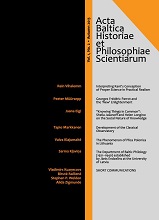Interpreting Kant’s Conception of Proper Science in Practical Realism
Interpreting Kant’s Conception of Proper Science in Practical Realism
Author(s): Rein VihalemmSubject(s): Epistemology, 19th Century Philosophy, Contemporary Philosophy, German Idealism, Philosophy of Science
Published by: Tallinna Tehnikaülikooli õiguse instituut
Keywords: apodictically certain knowledge; φ-science; Heidegger; Kant; Marx; practical realism; proper science; transcendental idealism;
Summary/Abstract: Immanuel Kant can be regarded as a philosopher related to the Baltic region. This paper, however, is not a historical study of the Baltic reception of Kant’s philosophy, but of Kant’s concept of proper science (eigentliche Wissenschaft), which is analyzed by comparing it to a theoretical model of science—φ-science—developed within the context of practical realism. The issues of realism and practice in philosophy of science—as well as their relations to Kant’s philosophical legacy—have been centrally important in the Baltic-Nordic region. According to Kant, only quantified sciences, exemplified by physics, are proper sciences, because mathematics provides a priori principles for cognizing physical laws, thus affording apodictically certain knowledge. This conception is rooted in transcendental idealism. In this paper it is shown how Kant’s transcendental idealism and apriorism as the basis for properly scientific—apodictically certain—knowledge can be overcome (or rather, “sublated”) within the practical realist position.
Journal: Acta Baltica Historiae et Philosophiae Scientiarum
- Issue Year: 1/2013
- Issue No: 2
- Page Range: 5-14
- Page Count: 10
- Language: English

